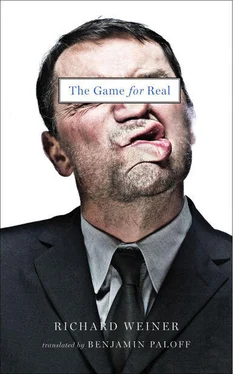He continues down his path, slowly. His conscience is calm, even though he knew there was something still much calmer than his conscience: the consciousness that something has just happened; the calm, remarkably calm consciousness that, you would say, had exteriorized itself: it’s walking by his side, a stone commander taking his time with his haunting. In the meantime, it’s content to be suffered, making sure to keep up with him. Something’s going on behind him, a betrayal; he sees, he sees, he sees a sinister cloud without having turned around. The commander — how very strange! — the commander has not changed, and still he’s become spectral, as though a specter were a spectral wanting, not a being; he assumes terror, the terror grows, and the greater his terror, the more anxiously he’s on guard not to quicken his pace. On the contrary, he hits the brakes as though he were counting solely on that foolish slowing; it didn’t matter that he knew it wouldn’t persuade anyone, that it wouldn’t ward off anything. Such pure solicitude is a pointless solicitude. And now: the cloud has burst, and when it shoots, it hits; he doesn’t see, but he knows, that the gun’s barrel ends as a country boy’s small, sensual mouth. God, who fell in love with its kisses even before He created it, has carved it beautifully and maddeningly.
“You say it’s that one there? He rubbed up against you? Oh, the pig! Hey, you there, swine, we see you! Horny geezer! Leave the girls alone. Hands off, I say! Lecher!”
He looks around, not understanding.
“Swine!”
A rush of steel-toed boots, a jauntily jumped beating; he hears:
“Get out of here! But next time. .”
Here is the looping staircase to the dark alley, to this coal-black alley. He takes them four at a time: only not a beating! Anything but a beating! — From six to eight there are several gas lamps burning here. Now they’ve already been lowered again. The darkness is so thick it leaves stains on clothes. — The steel-toed boots have forgiven him. But he’s still fleeing. He doesn’t know what’s actually happening, but even though he didn’t know what was actually happening, he knows he’s talking to himself, without having heard himself: “Years! Years are passing!” — For he is surprised (hee hee, someone says, unpleasantly surprised) that he gets short of breath; till now he hadn’t known he got short of breath; how does that happen? — so many years that he didn’t once happen to drop his civilian gait (hee hee, someone says, a sensible gait). Now he can’t. He collapses on a bench. It seats two; he’s unaware: someone’s already sitting with his back to him; he’s unaware. He inhales; he’s placed his hand on the backrest, withdrawn; his pinky has touched something alive; that living thing has not withdrawn: what is it? The pinky that had withdrawn ventures forth again, cautiously, like a snail’s antenna; the living thing is still there the whole time. Even now, the living thing has not withdrawn; not only has it not withdrawn, it’s spread itself out. It’s a hand, and behind it, a voice; one as cautious as the other. But, so far, all there is is:
“Ah!”
It’s him.
He says it again: “Ah?”—only this as a question so illuminating that an exhortative smile leaps across his closed lips.
“I’m relaxing,” says the man on the run.
“So relax,” says the man run down, his hand resting on the hand of the stranger, and the stranger’s hand says nothing, lingering.
“So relax,” says the man run down, and the hand at rest gave the stranger’s hand a little squeeze, then it pressed down, for that other one rose. He had shifted his seat with a movement that is God-knows-why like the quintessence of a military flanking maneuver.
“I’m relaxing.”
The hand slides along the back of the hand caught off guard, it’s tried the knuckle, it’s found it to be an easy obstacle, it’s scaled it, it makes for the forearm, for a while it sojourns guardedly on the elbow, having captured it gently; it examines the limp muscles: nothing; then a leap: it’s behind the shoulder blade; it’s slipped timidly along the nape; it’s presenting itself to the throat; and because every door stands wide open, just an itty bit more and the entire arm is here. It’s blackmailing the throat and the scruff, it’s coaxing the chest.
“Silly, silly. Of course I’m rotten. But my rottenness smells of sweet reseda. You silly.”
The head yields, the down cuddles and bribes. The torso follows. It had been expecting resistance; he’s looking forward to it. But he’s sinking into some invertebrate mass, beyond whose gluey non-particularity — he knows this — there is now only the egotistical helplessness of jelly.
And now it’s his hands that are on the march. Literally, on the march. Like sworn and skittish spies on the front lines, they’re looking out for whatever’s eventually coming up against them; their fear is such that they long for a liberating clash: conquer! Even though what they’re getting ready to conquer will eventually conquer them; his hands proceed; they’ve finally found a thumb; the defiant headland of the Adam’s apple; what an enticing staging ground it is: the index fingers, ring fingers, and pinkies are suddenly granted access where they will: they bypass the throat; the unsightly pinky, which he had not anticipated, has pressed hard into the back of the neck and is reliably supporting this entire line of attack.
“You fool, you. What are you doing? Love is. .”
“Love is. .”
“Love is — what?” The hands were growing sordidly curious. The hands feel like finding out; they give free rein. They’ll give for but a moment, to demonstrate that they haven’t been bought off; they’ve given free rein, and the eyes, their proxies, in full armor over the words still rushing around in panic, though they are already assured:
“Love is love. . Beggars can’t be choosers.”
The morning was dragging its feet. But so was his waking. — Oh, to pass away in that sleep, which he was devouring like a hungry man devours his first meager meal! — He half-rose, propped himself on his elbow, was careful. Don’t wake anyone! And mainly, not him, the one lying here. The left arm bent under his head, the sealed eyelids; right now, at this moment, there is nothing behind them, neither thought, nor desire, nor illusion. A lockbox. A magnificently beautiful lockbox, because it’s empty. In a while life is going to creep in there and besmirch it again. Nevertheless, right now it’s beautiful, with an unsullied beauty. Where does that come from? Where does it enter? That which ravishes the mass that didn’t recognize sin? If only he wouldn’t wake up, this one. So that our fellow could take his leave honorably from this peace, which to him now seems, for the first time, to be a place where it is possible to live. And from him here, whom he could at least compensate for his ugliness.
A half hour later. The muted voice of the world, as the motor of the cab that has stopped is idling. It disturbs nothing and no one. It resounds to the point of incomprehension. It speaks only to him who, having closed up his luggage, is waiting, dwelling on the face of the person who was sleeping, the only person whose gaze he might have been able to stand, forever, in spite of everything. But just now the gaze of that one person bespeaks a world eternally fallen.
Some money on the table. — He opened the door, carried his bags out. When he got into the cab, he knew he was leaving. — What? — He’s leaving. For he’s on his way to nowhere.
“The Paris train,” he said.
“I know,” the driver replied. — Morning was dragging its feet.
The train of this auxiliary line ran daily, but it wasn’t used to it. It was a homebody. Three hundred sixty-five departures a year, and each one as tediously awkward as the frightened excursion of an antediluvian aunt. Express trains, which make sense to everywhere and nowhere, carry people whose yesterdays have all been shed behind them; they take them to tomorrows, which are innumerable. On express trains, everything is possible, express trains bar nothing. — This little train, however, was shambling in vain: it was already far out of town, and yet it couldn’t be rid of it. It drew it behind; the town was inside it, its presence petty, bespeaking sulkiness and hardship, and like them it lined the horizon, the little town calling itself importunately, pitifully to mind, like a dog barking behind a truck: nothing, but so puffed-up that what had been there could no longer find room for itself. Love, let’s say, had boarded the train; love, which might alter the world’s appearance; hatred had boarded the train, pledged to the same miracle; hostility toward life and death had boarded the train, or else it was a fidelity that depersonalized people into virtues — it was loaded with destinies, sins, and saintly deeds, invisible as atoms and heavy as worlds — but the train got the better of everything: it squeezed down everything that was within it, to the point of fussiness. A single chance remained: the transfer stop. The little train was carrying an impatience for the transfer stop.
Читать дальше












